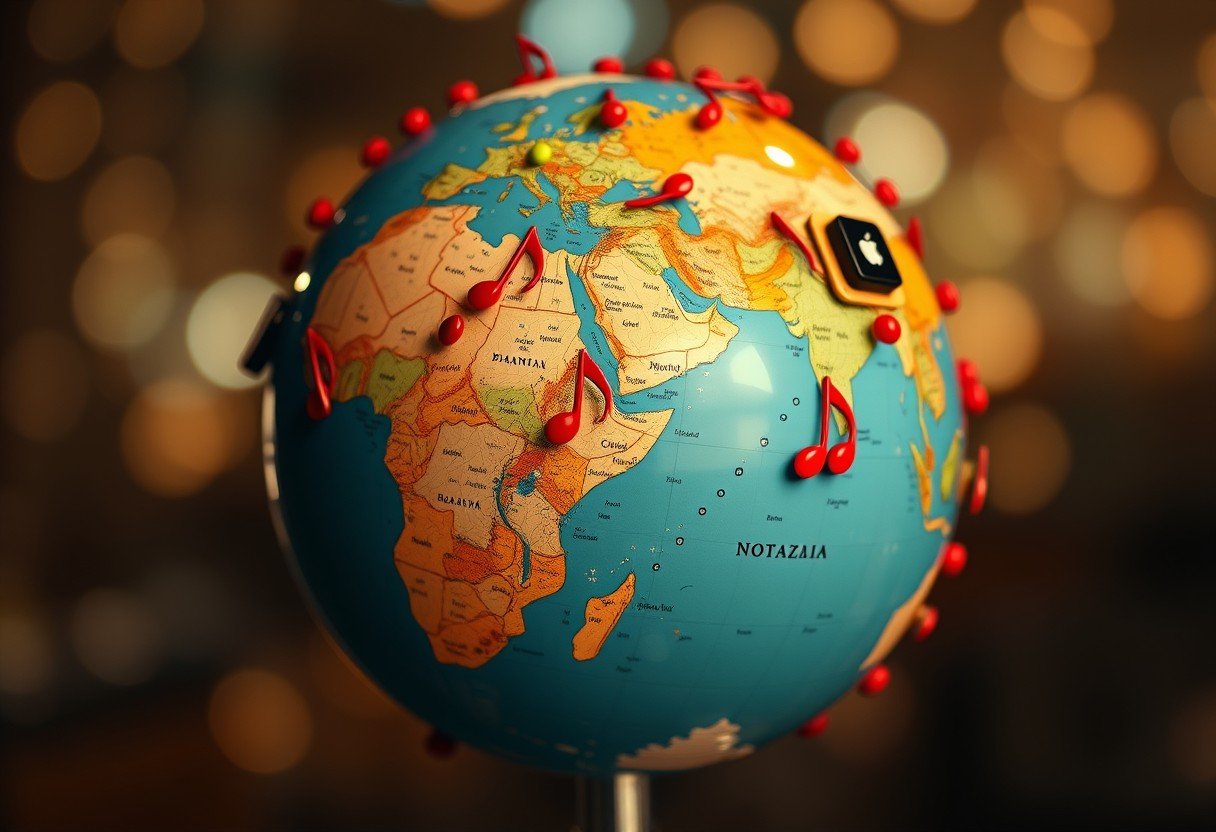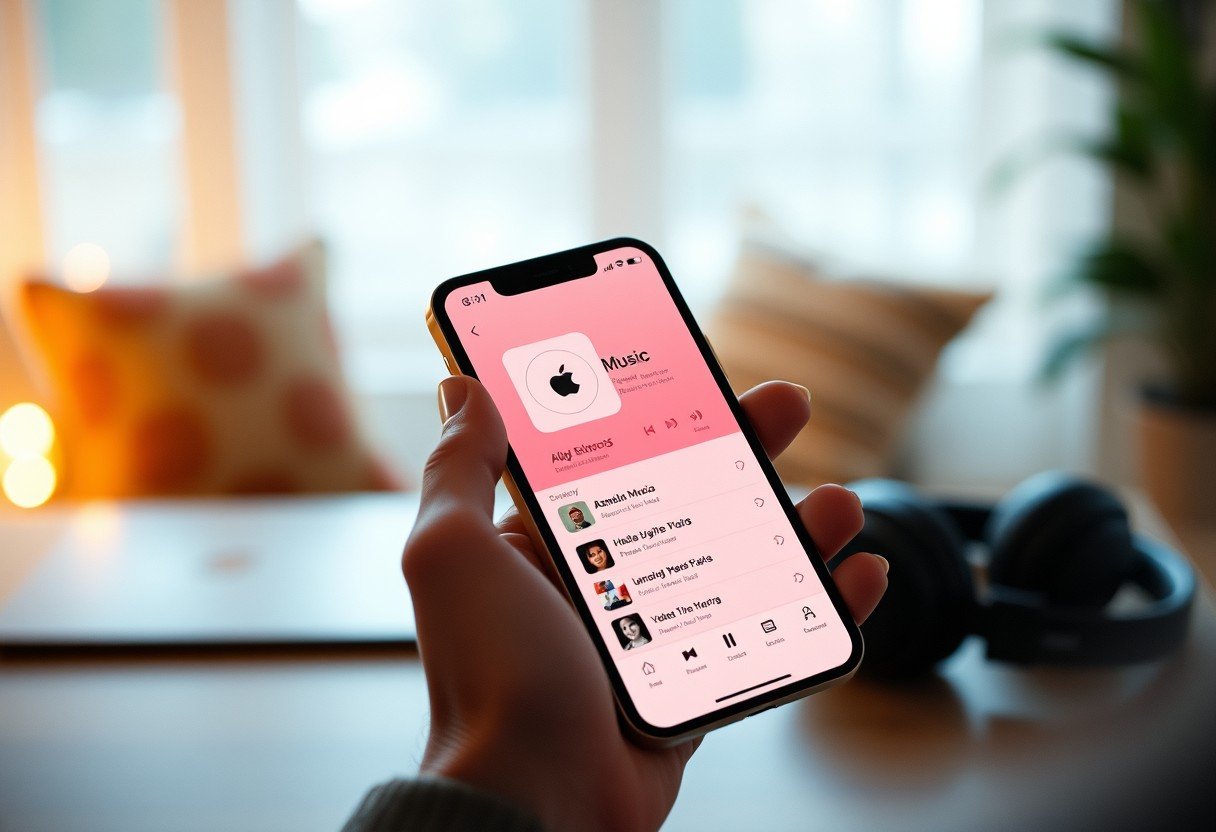Have you ever searched for a specific song on Apple Music, only to find it’s missing or greyed out? This happens because your access to music is often limited by your location. The availability of songs, albums, and even artists can change depending on which country you’re in. This is due to a practice known as region locking, which is tied to complex music licensing agreements that vary worldwide.
What Is Region Locking and Why Does It Happen?
Region locking is a digital practice that restricts access to content based on a user’s geographic location. For music streaming services like Apple Music, this means the library of songs available in the United States might be different from the one in Japan or the UK.
The primary reason for this is music licensing. Before a song can be streamed, Apple must secure the rights from record labels, publishers, and artists. These licensing agreements are often negotiated on a country-by-country basis. A record label might only grant streaming rights for an album in North America, making it unavailable to listeners in Europe or Asia.
This system is designed to comply with international copyright laws and respect the business strategies of music rights holders. Sometimes, an artist’s music may be exclusive to a different streaming service in a specific region, further complicating global availability on Apple Music.
How Licensing Agreements Dictate Your Playlist
At its core, the music you can or cannot listen to is decided by legal contracts. These licensing agreements are incredibly detailed, specifying which territories a song can be played in and for how long. Apple has to manage thousands of these deals with different labels across the globe.
This is why you might see a new album release from your favorite artist, but it’s not available in your country’s Apple Music store. The artist’s label may have a staggered release schedule or different distribution partners in various parts of the world.
Furthermore, local laws and cultural norms can also influence the music catalog. Some countries may have censorship laws that restrict certain lyrical content, leading Apple to remove specific tracks from that region’s library to comply with local regulations.
Does Your Apple ID Location Matter?
Yes, your Apple ID’s country or region setting is the main factor that determines which version of the Apple Music catalog you can access. When you sign up, your account is tied to the country of the payment method you provide. This means your access is based on your account’s region, not your physical location at any given moment.
For example, if your Apple ID is registered in Canada, you will see the Canadian Apple Music library, even if you are temporarily traveling in Mexico. Your playlists and saved music are all linked to your home country’s catalog.
Changing your Apple ID region is possible, but it comes with its own set of challenges. You’ll need a valid payment method from the new country, and you might lose access to previous purchases made in your old region’s store.
The Impact on Your Music Library When You Travel
If you frequently travel, you might notice some frustrating quirks. While your library is tied to your home country’s Apple ID, streaming availability can sometimes be affected by your physical location, especially with downloaded content.
However, the biggest change occurs if you permanently move to a new country and decide to switch your Apple ID region. When you change your account’s country, your entire Apple Music library is wiped and replaced with the library of the new region. Any songs you had saved that aren’t licensed in the new country will disappear from your playlists. It’s a fresh start, which can be a major inconvenience for users with carefully curated collections.
Can You Use a VPN to Bypass These Blocks?
Using a Virtual Private Network (VPN) or a proxy service is a popular method people try to get around region locks. A VPN can mask your IP address and make it appear as though you are browsing from another country, potentially unlocking its music catalog.
While this can sometimes work, it’s not a foolproof solution and comes with significant risks. For one, Apple’s systems are designed to detect and block such workarounds. More importantly, using a VPN to circumvent regional restrictions is a violation of Apple Music’s terms of service.
Engaging in this practice could lead to serious consequences. Here are some of the risks involved:
- Account Suspension: Apple reserves the right to suspend or even terminate your account if they detect a terms of service violation.
- Payment Issues: Your payment method is tied to your account’s region, and a mismatch with your IP address could trigger fraud alerts.
- Reduced Performance: VPNs can slow down your internet connection, leading to buffering and lower streaming quality.
It is crucial to weigh these risks before attempting to use a VPN to access region-locked content. A reputable VPN is essential, but it doesn’t eliminate the policy violation.
What to Do When Your Favorite Song Is Missing
Finding out a song is unavailable can be disappointing, but you have a few options. The first step is to confirm it’s a regional issue. You can search online forums or music communities to see if others in your country are facing the same problem.
If the content is indeed unavailable, your best course of action is to contact Apple Support. While they can’t magically make a song appear, they can provide official clarification on why it’s not available and whether there are plans for it to be released in your region.
Sometimes, artists or labels will announce regional release dates on their social media channels. Following them can keep you informed about when their music might become available where you live.
The Future of Global Music Streaming
As the world becomes more connected, there is growing demand for a borderless music experience. Users want access to the same content regardless of their location, and this pressure could influence how streaming services operate in the future.
Many experts predict that streaming platforms like Apple Music will move towards more global licensing deals. This would simplify the process for both the services and the rights holders, ultimately creating a more uniform and consistent experience for listeners worldwide.
While regional restrictions are currently a reality, the long-term trend points towards a more open and globally accessible music landscape. As consumer expectations shift, companies will likely adapt to offer the seamless access that users demand, breaking down the digital borders that currently exist.
Frequently Asked Questions about Apple Music Regions
Is Apple Music content really region locked?
Yes, Apple Music’s content is subject to region locking. The availability of songs, albums, and artists varies significantly between countries due to international licensing agreements and copyright laws.
Why can’t I find a specific song in my country?
A song might be unavailable in your country because the record label or artist has not secured a streaming license for your specific region. It could also be due to different release schedules or exclusivity deals with other platforms in your area.
What happens to my music if I move to another country?
If you move and change your Apple ID to the new country, your existing Apple Music library will be erased. You will then get access to the music catalog available in your new region, and you’ll have to rebuild your playlists.
Is it safe to use a VPN for Apple Music?
Using a VPN to access content from other regions violates Apple Music’s terms of service. Doing so puts your account at risk of being suspended or terminated. It can also cause performance issues and payment complications.
How can I check if a song is available in my region?
The easiest way is to search for the song or album directly in the Apple Music app. If it doesn’t appear or is greyed out, it is likely not available. You can also check online music forums for information on regional availability.









Leave a Comment